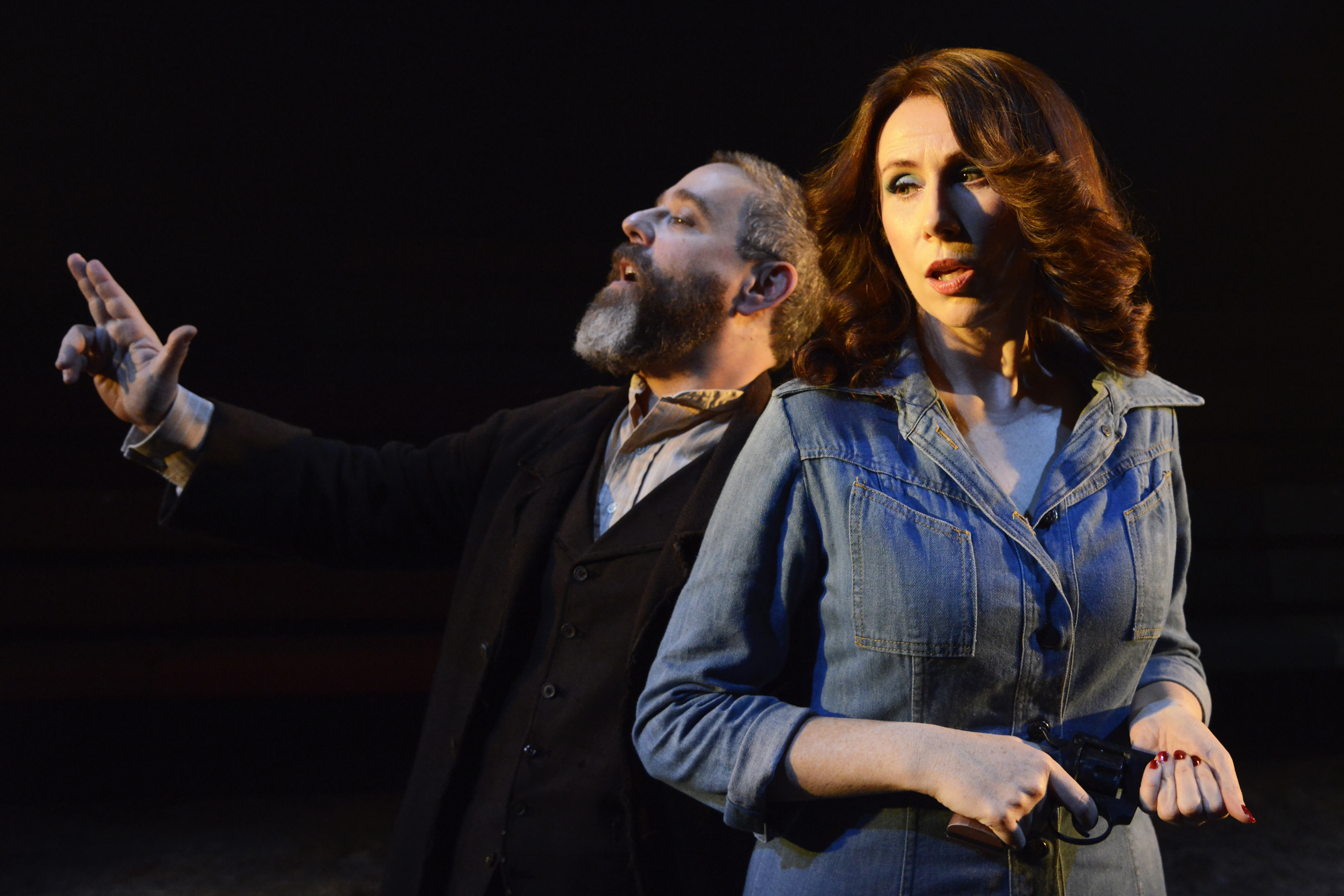 Andy Nyman as Charles Guiteau, Catherine Tate as Sarah Jane Moore. Photo Nobby Clark
Andy Nyman as Charles Guiteau, Catherine Tate as Sarah Jane Moore. Photo Nobby Clark
The Menier Chocolate Factory’s production of Assassins took me completely by surprise. Knowing Stephen Sondheim’s work, a certain level of the unexpected is anticipated – a musical about individuals who assassinated, or attempted to assassinate, US presidents is inherently unconventional. Sondheim, alongside book writer John Weidman, crafts a narrative that is episodic, jumping through time, blending stories, and ultimately coalescing into a disturbingly coherent whole. This inherent intrigue was expected, yet the Jamie Lloyd-directed production unveiled layers I hadn’t anticipated, making the experience profoundly impactful.
What resonated most powerfully in this rendition was its stark political relevance. While the Donmar Warehouse production from 22 years prior (in 1992, not 12 as initially recalled) might have been perceived as a study of societal misfits – the isolated, the left-behind, those seeking purpose in a destructive manner – this contemporary staging hits much closer to home. The narratives of these assassins, driven by personal betrayals and societal disillusionment, feel acutely pertinent to our current climate. The poignant moments, such as Giuseppe Zangara (Stewart Clarke) expressing his anguish in Italian and Leon Czolgosz (David Roberts) embodying the plight of an impoverished Polish worker yearning for a better existence, evoke potent reflections on broken immigration aspirations and the crushing weight of societal neglect.
The non-linear structure of Assassins, where timelines collapse and stories intertwine through free association, amplifies the production’s unsettling power. These connections, seemingly disparate at first, tighten like a noose, creating an atmosphere of inescapable tension. Jamie Lloyd’s direction maintains an unrelenting grip, offering the audience no respite. This relentless intensity, while artistically brilliant, might leave you breathless and deeply uneasy, a testament to the production’s immersive nature.
The ensemble cast delivers performances that verge on perfection. With every actor present on stage throughout the performance, a palpable sense of collective responsibility permeates the production. Each cast member contributes to the unfolding narrative, even participating in the acts of violence, blurring the lines between observer and participant. Aaron Tveit embodies John Wilkes Booth with a chilling charisma, portraying him as the charismatic leader, confident in his deadly conviction. Simon Lipkin, as The Proprietor, masterfully shifts roles – from presidents to children to sinister figures – acting as a macabre master of ceremonies guiding us through this dark journey. Andy Nyman’s portrayal of Charles Guiteau is mesmerizing; his Chaplin-esque physicality is coupled with a disturbing, broken optimism that is both captivating and unsettling, making it impossible to look away.
Catherine Tate’s Sarah Jane Moore brings a darkly humorous absurdity to the stage, provoking laughter that catches in your throat, laced with unease. Jamie Parker, as the Balladeer, initially exudes a relaxed demeanor, which ultimately heightens the impact of his character’s devastating final act, a twist best left unspoiled. Carly Bawden’s Squeaky Fromme is both unnervingly warm and clearly troubled, the girl-next-door with a dangerous edge. Mike McShane’s Samuel Byck is a tragic figure, akin to Willy Loman pushed beyond delusion into utter self-destruction. Stewart Clarke’s Giuseppe Zangara burns with internal rage, while David Roberts’ Leon Czolgosz embodies the simmering resentment of exploited workers. Harry Morrison’s John Hinckley portrays a heartbreaking desperation for human connection that implodes tragically. Each actor embodies their individual assassin while simultaneously contributing to a powerful collective portrayal of societal breakdown.
The aesthetic of the production is strikingly reminiscent of a warped Cabaret set within a decaying fairground. Soutra Gilmour’s set design is characterized by the harsh, jarring contrasts of 1980s horror cinema. It’s a visual nightmare reflecting not only Pennsylvania Avenue but also the desolate streets and foreclosed homes of cities like Pittsburgh and Detroit – a landscape of American decay and disillusionment.
Having witnessed Assassins, anticipation is high for Jamie Lloyd’s upcoming direction of Peter Barnes’ The Ruling Class. These two productions, Assassins and The Ruling Class, already feel like companion pieces, exploring themes of societal misfits and those in power, desperation and moral void – a potent commentary on the fractures within society.
